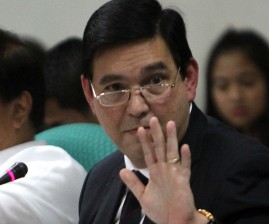Private sector blamed for lack of jobs

Sen. Ralph Recto INQUIRER FILE PHOTO
MANILA, Philippines—A senator and a provincial governor, both of them economists, are blaming the “selfish” rich for the widening income inequality in the Philippines, which persists despite the economic growth in the first three years of the Aquino administration.
“The job of the private sector is to create wealth and jobs. Unfortunately, the private sector in the Philippines does not have a high degree or culture of giving and sharing,” said Sen. Ralph Recto in a text message to the Inquirer.
Albay Gov. Joey Salceda said there was a need to frontally deal with the central issue of the sociopolitical economy.”
“Are we focusing too much on government, which accounts for only 17 percent of GDP (gross domestic product) or is it the 83 percent controlled by the private sector that is creating too many poor people?” he said in an e-mail.
Recto and Salceda said this social inequality or injustice was the reason for the surge in unemployment to 7.5 percent or 3.086 million in April this year from 6.9 percent or 2.803 million in the same month a year ago despite a record 7.8 percent growth in the economy in the first quarter this year.
Article continues after this advertisementWhile the Aquino administration has been praised for the strong peso, robust stock market, and newly acquired investment grade credit rating, it has been lambasted for failing to translate this into more jobs and lessening poverty. The Philippines has one of the highest gaps between the richest and poorest citizens of any country in Asia.
Article continues after this advertisementRecto said the job of the government was “to provide the environment for business to thrive (such as ensuring macroeconomic stability) by regulating greed in the private sector and social safety nets for those who cannot help themselves.” He said the rich must do its share in spreading the wealth because the government cannot do it on its own.
“We can do much more to create well-paying jobs and reduce poverty. [Rich Filipinos] are unlike [those] in the US were individuals and the private sector make large donations to charitable institutions. Tax policy may incentivize this practice,” said Recto.
“Social injustice is very much stubborn and structural, historically persistent and policy-immune. The Philippine predicament has been overstudied and overdiscussed but undersolved. It is time for the government to take risks and use its most potent weapon to strike hard at the two-headed monster of unemployment-poverty—and that tool is its institutional capacity as a binding force for wealth creation which means the administration should move beyond the usual NEDA (National Economic and Development Auhtority) portfolio of solutions,” said Salceda.
“Although employment may be affected by the way the government chooses to spend and the way it chooses to tax, employment is an outcome of a far more complex set of economic processes and policies, thus the employment picture must be addressed far beyond fiscal policy,” said Salceda.
Salceda suggested that the government set more ambitious investment targets, such as targeting $1 billion investments in manufacturing from Japan, or host world-class events that would place the Philippines on the radar such as a visit by Pope Francis; increase the current international advertising budget of P1.4 billion to match Vietnam’s $150 million; and focus on growth areas outside of Metro Manila by building infrastructure projects in the countryside to increase these areas’ absorptive capacity.
“Structural injustice can not be corrected in three years. We have a fresh and good start with the President, who is honestly reformist and sincerely egalitarian, but his intentions, no matter how pure, are invariably negated by the rest of the dominant players in our society. Nevertheless, the presidential persona is a potent wellspring of popular support for structural reforms that can override such structural obstacles,” said Salceda.